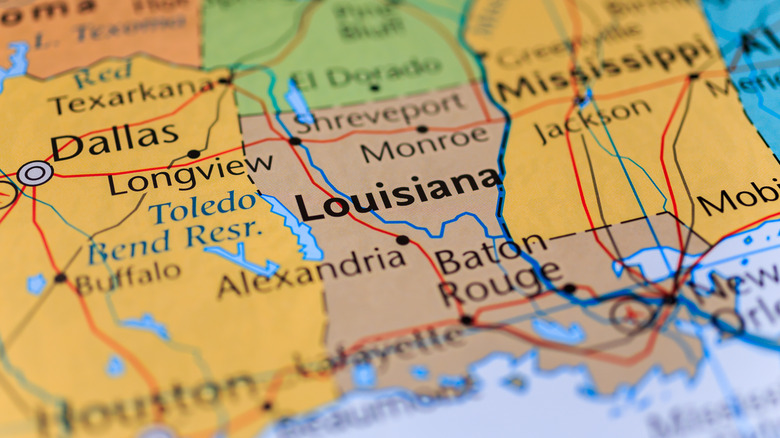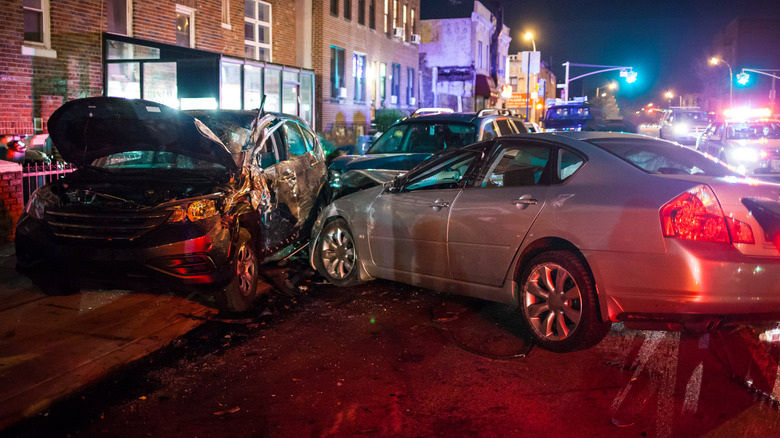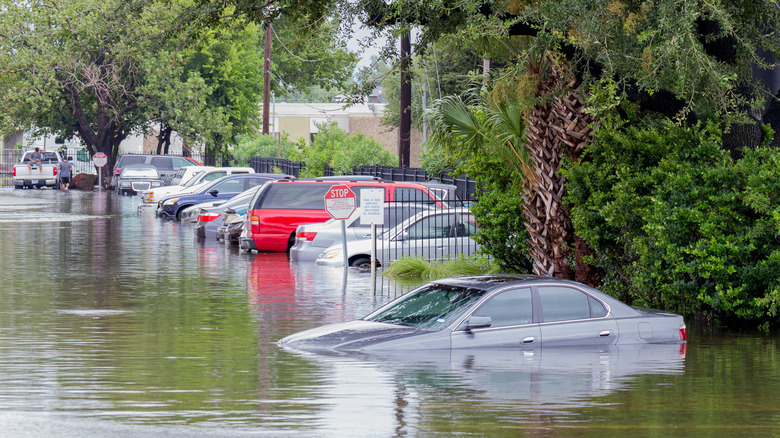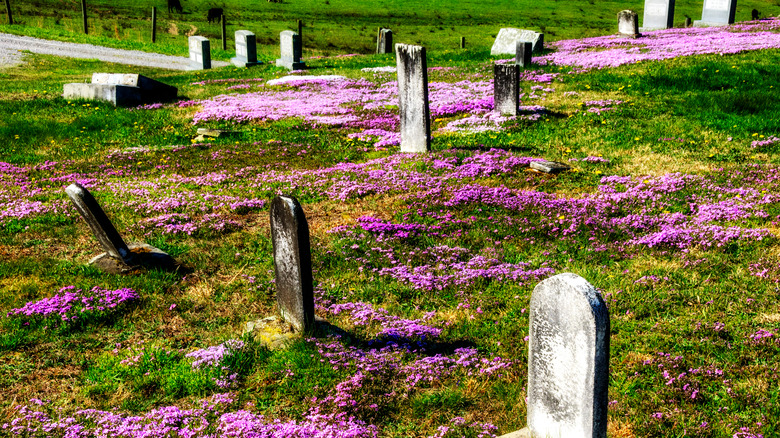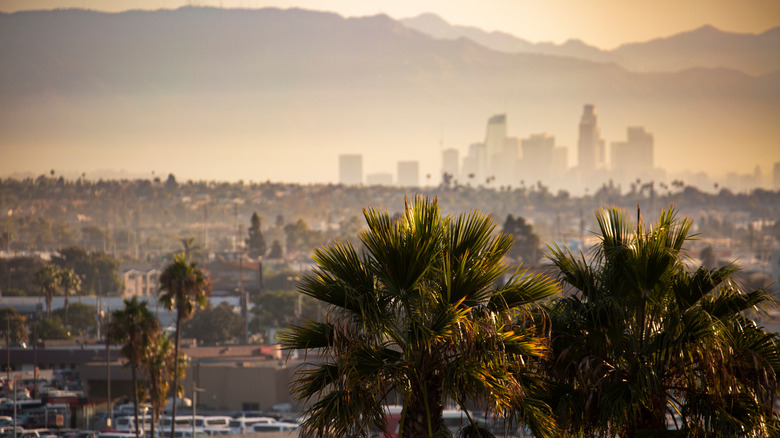The Most Dangerous American States
There are, for better or for worse, a lot of different ways to define danger. There is danger of death or injury, of sickness or robbery, of disaster, of animal attack, of domestic violence, and on the list goes. Just as the many potential sources of danger are varied, so, too, is the likelihood of your experiencing them based on where you are. And that, at least, is a bit of silver lining: For example, while you might be the most likely to be killed in an automobile accident in Alabama, at least your chances of encountering a serial killer are lower than you face in California. And while Oklahomans are at the greatest risk of suffering from domestic violence, they are at less risk than their Texan neighbors to the south of being killed by an animal.
Small comforts perhaps, but you can always pack up and move. And for the record, according to the Pew Research Center, there have been "dramatic declines in U.S. violent and property crime rates since the early 1990s, when crime spiked across much of the nation." So as bad as some of the stats below may seem, things have gotten better in recent years, not worse.
Here are 12 categories of danger and the states that have the dubious distinction of topping the charts for each when it comes to the likelihood you will suffer from said dangers while within their borders.
Louisiana has the highest homicide rate in the nation
Some statistics bounce back and forth from state to state like a football, such as where you can find the most new job opportunities, the worst traffic, the best sports teams, and so on. Other stats hold fast, and when it comes to Louisiana, there is one grim figure the Pelican State just can't seem to shake: It leads the nation in per capita homicides, and it has done so for decades.
According to The New York Times: "For 31 straight years, Louisiana has reported the nation's highest murder rate." Data sourced from NOLA.com and the FBI shows that the state averages about 10 murders per 100,000 people in a typical year, with the figures driven up by the ghastly annual per capita murder rate in New Orleans, which has been as high as 41.7 homicides per 100,000 residents in recent years. That's about 1 in 2,400 people, for a more tangible perspective. Even as murders across America have plummeted year after year, and as some states and cities have become much safer (take the murder rate in New York City, which was around 29 killings per 100,000 people in 1990 and down to around 4 per 100,000 in 2015, according to World Atlas), Louisiana just can't buck the trend.
Alabama is the most dangerous state for motorists
According to data compiled by Edwards Kirby: "Alabama ranked first as the most dangerous state for drivers ... While high rates of DUIs and serious motor vehicle injuries certainly contributed to Alabama's ranking, perhaps the most crucial factor was the number of young Alabamians on the road." Both speed and alcohol (and other substances) are leading factors of teen driving deaths in Alabama, according to AL.com, and these are also factors for traffic accidents and deaths amid the population as a whole.
Alabama is also quite a dangerous place for people in proximity to cars. It ranks #2 in terms of the most dangerous state for pedestrians, trailing only Florida when it comes to the danger of death or injury a pedestrian faces, according to AL.com. In 2019, the most recent year for which complete data is available, Alabama saw 120 pedestrians killed by motor vehicles. The average number of pedestrian deaths is just over 116 per year when statistics from 2016 to 2019 are analyzed. And pedestrians of color are at a much higher likelihood than those of Caucasian descent to end up injured or killed by a motorist in Alabama.
Washington, D.C. has the worst property crime rate in America
Washington, D.C. may not be a state yet, but if its 692,700 or so residents have their way, it will be soon enough. Regardless of technical status, D.C. already holds one title that the district-cum-state will surely hope to relinquish some day: Washington is far and away the nation's leader when it comes to the danger residents face for property crime. According to data aggregated by Statista, the 2019 property crime rate in D.C. was 4,367.1 per 100,000 residents, which boils down to one in every 229 people in D.C. likely to be the victim of property crime in a given year.
And bear in mind that "property crime" is an expansive term. According to the National Institute of Justice: "Property crimes include burglary and theft as well as vandalism and arson." So the category includes everything from a relatively minor smash-and-grab home invasion burglary to the potential total destruction of a property. According to data sourced from the FBI, in 2017 nationwide, "Larceny-theft accounted for 71.7 percent of all property crimes. Burglary accounted for 18.2 percent, and motor vehicle theft for 10.0 percent. Property crimes [overall] in 2017 resulted in losses estimated at $15.3 billion."
Alaska has the highest per capita annual cases of rape
Alaska is far and away the most dangerous state for per capita instances of forcible rape — as in there are around double the per capita annual instances of rape there than in the state with the next highest number, according to Statista. In 2019, there were 148.7 rapes reported in Alaska per 100,000 residents, or one for every 672.4 people. In Arkansas, the state with the next highest per capita rate, there were 77.2 rapes per 100,000 people, or one for every 1,295 people, which is a figure almost 50 percent lower than in AK.
The state with the lowest per capita reported cases of rape in 2019 was New Jersey, with 17.2 per 100,000 residents, or just one per more than 5,813 people. The national average that year was 42.6 cases per 100,000 Americans. These statistics do not account for incidents of statutory rape, nor, of course, do they account for rape cases not reported to the authorities, so the actual numbers in Alaska and all states are surely higher. In fact, according to RAINN: "Only 310 out of every 1,000 sexual assaults are reported to police."
Natural disasters wreak the most devastation on Texans
When you hear of a natural disaster, your thoughts might go first to a hurricane ravaging Florida, a wildfire or earthquake laying waste to California, or to a tornado outbreak tearing across swaths of midwestern states. But, in fact, it is Texans who are at the greatest danger of dealing with natural disaster damage in any given year. And understandably so, given that Texas' immense and varied geography means it can experience hurricanes and the storm surges and flooding that come with them, wildfires, tornadoes, and even, as we saw recently, the devastating results of a winter storm. From mid-February through early March 2021, Texas was in the grip of an icy storm that caused dozens of deaths, knocked out the power to millions, and caused severe damage to homes, businesses, and infrastructure across much of the state, according to The Texas Tribune.
And according to Value Penguin, in any given year, Texan homeowners can expect to incur disaster damage costing them $1,478 on average. The national average for disaster damage expenses is just $104. That, of course, means that many residents of many states pay out significantly less than that in natural disaster-related repairs and recovery, if they even incur any such costs at all.
West Virginia has the highest annual per capita deaths when all causes are combined
If you want to have a long life, you may not want to live in West Virginia, according to the statistics. In terms of the overall mortality rate, West Virginia is the deadliest state in America. There are 945.4 deaths per 100,000 West Virginians in any given year, meaning that one out of every 106 West Virginians is likely to be living their last year on Earth at any given time, according to data from the Kaiser Family Foundation.
According to the Centers for Disease Control and Prevention, the top five leading causes of death in West Virginia are, in order, heart disease, cancer, accidents, chronic lower respiratory diseases (meaning bronchitis, emphysema, and asthma, for example), and stroke. The state also ranks high on the list for annual homicide rates, suicide rates, firearm deaths, and drug overdose deaths, and it is well above the national average for infant mortality rates.
Alaska has the highest overall violent crime rate
As if the chilling forcible rape statistics were not enough, Alaska also leads the United States when it comes to all violent crime on a per capita basis. One in 113 people in the state can expect to be the victim of a violent crime each year, according to MoneyWise. While the homicide rate is lower than that of Louisiana, at about 6.4 out of 100,000 residents murdered in a given year, overall, violent crime is rampant in the state.
Violent crime can include anything from an unlawful killing to a mugging, a rape, or a physical attack with no motive other than injury. Indeed, according to SafeWise: "Aggravated assault was the most common violent crime in Alaska statewide ... it accounted for 68% of the state's violent crime." Given the high incidence of violent crime in the state, it's no surprise that a reported 34% of Alaskans "worry about their safety on a daily basis." That said, the actual statistics aside, according to data from SafeWise (via GlobeNewswire): "58 percent of people living in the United States report feeling worried about their safety every single day."
Texas is also the state with the highest annual deaths from animal attacks
As if the natural disasters weren't enough, Texas is also the state that leads the nation in deaths caused by animals, with the deadly culprits ranging from snakes to alligators to spiders to bears. According to data compiled by the CDC and reported on by The Washington Post, from 1999 to 2013, an average of around 24 people were killed by an animal in Texas. This is, however, not a per capita rate but simply raw numbers, so you may be at more actual danger of death via animal in other states.
That said, the immensity of Texas and the variety of its regions, which range from forest to desert to coast and more, does mean a huge roster of potentially deadly animals. Still, the animal that is deadliest to humans in Texas is somewhat unexpected: It is the deer, which is a danger to motorists, according to Lonestar 99.5. The second most dangerous animal in Texas in terms of human mortality are bees, wasps, and hornets when these stinging insects are taken as a whole. Beyond deer and bees, the more headline-grabbing animals may be dangerous, but in many states, you are more likely to be accidentally killed by a dog than by a mountain lion, shark, or venomous spider.
West Virginia leads the nation in accidental opioid overdose deaths
As the horrific and deadly opioid epidemic swept over the United States in the past couple of decades, it was inevitable that some state would end up with the sad distinction of being the worst for overdose deaths. That title currently belongs to West Virginia, where, as of 2018, the most recent year for which complete data is available, there were 42.4 "opioid-involved" overdose deaths per 100,000 persons, according to data from the National Institute on Drug Abuse. That's one person in West Virginia out of every 2,358 dying as a result of an opioid drug overdose in any given year.
And the numbers in West Virginia are much higher than in the state with the next highest number of opioid overdose deaths per year, which is West Virginia's neighbor Maryland, with 33.7 such deaths per 100,000 people each year.
California has produced more serial killers than any other state
While in per capita historical terms, California may not have the highest number of serial killers (that stat again belongs to Alaska), it is the state that has produced far and away the largest number of known serial killers, repeat murderers who have killed far and away the highest number of victims. More than 120 known serial killers did their grisly deeds in California, leaving behind 1,628 victims and counting, according to Serial Killer Shop.
America as a whole has a serious serial killer problem, as it turns out. All told, the United States has experienced more than 2,700 known serial killers to date. The country with the next highest known number of serial killers is England, where there have been a mere 145 documented serial killers. Even when the difference in overall population is accounted for, that's a stunning discrepancy, with some 18 times more of these murderers stateside.
Oklahoma experiences the highest rate of domestic violence
Oklahoma is home to the worst numbers in the nation when it comes to violence occurring in the home. According to data from World Population Review, almost half of all women living in Oklahoma will experience domestic violence in their lifetimes — the actual statistic is 49.1% of women suffering it. Perhaps surprisingly, men are also at very high risk for experiencing domestic violence in Oklahoma, with about 40.7% of male residents affected by it at some point.
The report from World Population Review describes such violence as "intimate partner physical violence, intimate partner rape, or intimate partner stalking" and also states that Oklahoma ranks third in the United States when it comes to the number of women who are killed by men in "single-victim, single-offender" murders. Around the nation as a whole, according to data cited by the Oklahoma Coalition Against Domestic Violence and Serial Assault: "Each year approximately 1.5 million are raped and/or physically assaulted by their current or former husbands, partners, or boyfriends."
California has the worst air quality in America, shaving years off life expectancy
Poor air quality may not be as vivid or scintillating of a topic as natural disasters, deadly animals, or murders, but it's one of the most dangerous things a human being can face. And in the United States of America, it's California where people deal with the worst air quality in the country. An article published by Molekule reads in part: "California consistently ranks as the most polluted state in the country. ... Its most significant sources of air pollution come from automobile traffic, as well as industrial pollution. The local topography in the state, especially in farming regions, along with its warm weather, lends itself to trapping pollution within valley walls, increasing the levels of ozone. Wildfire smoke also contributes to poor air quality, and the threat of these extreme air quality events are on the rise."
For some perspective on just how dangerous poor air quality is, note this shocking statistic from the National Institute of Environmental Health Sciences, which itself was sourcing World Health Organization data: "Air pollution accounts for 1 in 8 deaths worldwide." How does air pollution kill? By making all sorts of other conditions so much worse. The NIH report goes on to state: "Air pollution can now be linked to a larger number of conditions, including cardiovascular diseases and cancer, in addition to acute respiratory infections and chronic obstructive pulmonary diseases." Simply put, Californians are in danger with every breath they take.
